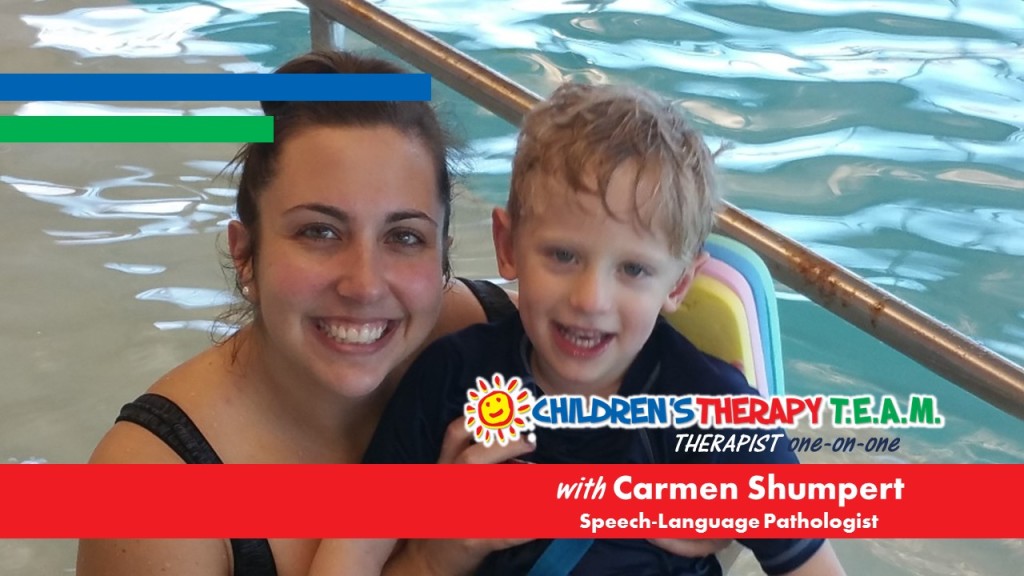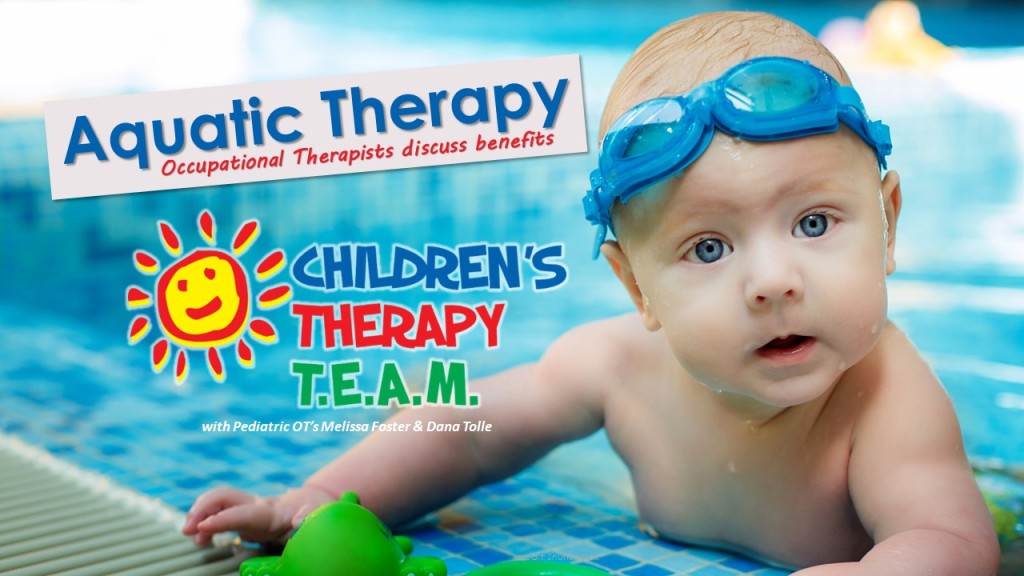Dear Melissa,
I hear that TEAM just opened a new Aquatic Center. My child loves to swim! Would adding aquatic therapy be appropriate?
I hear that TEAM just opened a new Aquatic Center. My child loves to swim! Would adding aquatic therapy be appropriate?
 I know it is odd to think about a child swimming when it is still cool outside, but Children’s Therapy TEAM now has an indoor pool facility! We offer physical, occupational, and speech therapy at our new Aquatic Center in Bentonville, at 1500 SE 28th Street. The center is approximately 10,000 square feet with 5 treatment rooms, a large gym area, and 2 pools, one large and one small. The center also includes 2 large changing restrooms with showers. The large pool is zero entry, has a lift, and is set at a water temperature of 90 degrees. The small pool is set at a water temperature of 92 degrees. TEAM currently has 7 full/part time physical therapists at the center, 3 occupational therapists, and 4 speech-language pathologists. By March, PT will increase to 8 therapists, and OT will increase to 7.
I know it is odd to think about a child swimming when it is still cool outside, but Children’s Therapy TEAM now has an indoor pool facility! We offer physical, occupational, and speech therapy at our new Aquatic Center in Bentonville, at 1500 SE 28th Street. The center is approximately 10,000 square feet with 5 treatment rooms, a large gym area, and 2 pools, one large and one small. The center also includes 2 large changing restrooms with showers. The large pool is zero entry, has a lift, and is set at a water temperature of 90 degrees. The small pool is set at a water temperature of 92 degrees. TEAM currently has 7 full/part time physical therapists at the center, 3 occupational therapists, and 4 speech-language pathologists. By March, PT will increase to 8 therapists, and OT will increase to 7.
While I personally keep my feet firmly on land, I interviewed Aquatic Center TEAM occupational therapist, Dana Tolle, for the scoop:
Melissa: Who is most appropriate for aquatic therapy?
Dana: The water provides good resistance, so the kiddo who struggles to meet strengthening and coordination goals on land is appropriate for pool therapy. The buoyancy of the water helps decrease the effect of gravity and allows the child to have more success with body weight movements and strengthening activities.
Dana: The water provides good resistance, so the kiddo who struggles to meet strengthening and coordination goals on land is appropriate for pool therapy. The buoyancy of the water helps decrease the effect of gravity and allows the child to have more success with body weight movements and strengthening activities.
Melissa: What do you like best about aquatic therapy?
Dana: I like how much the kids enjoy being in the water. It is more motivating for them to complete almost any therapy activity since they are having fun in the pool! I also like that it provides a medium for our kids to participate in an activity just as their typically developing peers do. The pool provides an ideal amount of sensory input, but it also provides so much more than that. It provides a much gentler platform for kiddos to work on strength, coordination, and self-care goals.
Dana: I like how much the kids enjoy being in the water. It is more motivating for them to complete almost any therapy activity since they are having fun in the pool! I also like that it provides a medium for our kids to participate in an activity just as their typically developing peers do. The pool provides an ideal amount of sensory input, but it also provides so much more than that. It provides a much gentler platform for kiddos to work on strength, coordination, and self-care goals.
Melissa: What can you do in the pool that you can't do in traditional OT on land?
Dana: The pool allows for better handling of kids. The kids who struggle to walk or weight-bear on land display better trunk control and movement in the water. The pool also provides constant sensory input and allows us to work on self-care skills in an appropriate and natural environment for children.
Dana: The pool allows for better handling of kids. The kids who struggle to walk or weight-bear on land display better trunk control and movement in the water. The pool also provides constant sensory input and allows us to work on self-care skills in an appropriate and natural environment for children.
Melissa: Do you have any additional comments to add?
Dana: We have seen many successes in the pool. Kids are doing a better job following directions, becoming more independent with dressing, gaining independence in walking, improving bilateral coordination skills, increasing safety awareness, and displaying overall improved strength. As therapists, we have enjoyed sharing in these successes with each and every child!
Dana: We have seen many successes in the pool. Kids are doing a better job following directions, becoming more independent with dressing, gaining independence in walking, improving bilateral coordination skills, increasing safety awareness, and displaying overall improved strength. As therapists, we have enjoyed sharing in these successes with each and every child!
It is evident by Dana’s responses, that the kiddos love pool therapy, and the therapists love pool therapy. However, you know me; I want the facts. Here are some studies on the topic
- In a study of 37 infants/toddlers (6-30 months of age), the aquatics therapy group demonstrated “significantly greater gains in functional mobility” than the control group, which received traditional, land-based therapy. (Pediatric Physical Therapy, 2007)
- In a 2006 article published in the Journal of Physical and Occupational Therapy for Pediatrics, a study was conducted using 18 children with autism. Clinicians found improved swimming skills, attention to task, muscle strength, balance, eye contact, and the ability to tolerate touch. The children with ASD also demonstrated improved safety awareness around water. This is a huge benefit, given that drowning is one of the leading causes of death among children with autism.
As you can see, the literature supports aquatic therapy with pediatric populations for not only physical gains, but social and safety gains as well. If you are interested in aquatic therapy for your child, give us a call!

For more specific information related to speech-language therapy in the pool my colleague, Carmen Shumpert, has written about the benefits of water-based speech therapy in her TEAM Therapist One-on-One piece, Aquatic Speech-Language Therapy? My Top 6 Reasons I say, "Yes!"
Resources:
The Effect of Aquatic Therapy on Functional Mobility of Infants and Toddlers in Early Intervention. Pediatric Physical Therapy. 2007.
The Effect of Aquatic Therapy on Functional Mobility of Infants and Toddlers in Early Intervention. Pediatric Physical Therapy. 2007.
Clinicians’ Perceptions of the Benefits of Aquatic Therapy for Young Children with Autism. Physical and Occupational Therapy in Pediatrics. July, 2009

